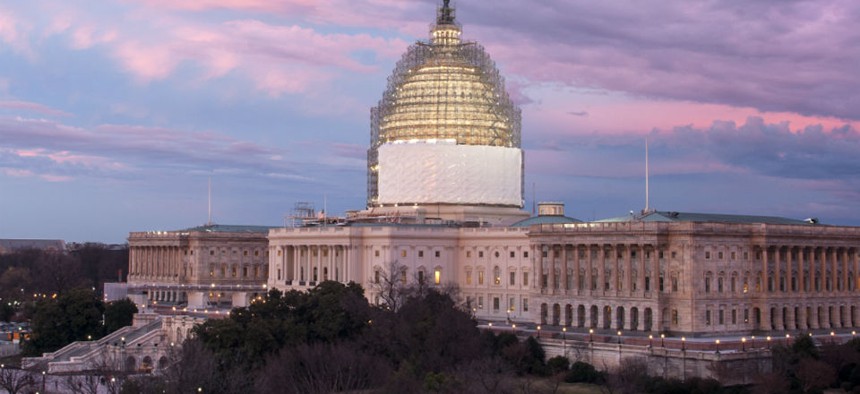
Architect of the Capitol
Homeland Funding Path Murky as Recess—and a Shutdown—Loom
While leaders look for an end to DHS stalemate, the Senate will tackle nominees and the House will finalize a Keystone bill.
Congress has one week before funding for the Homeland Security Department morphs from a stalemate into a crisis.
With a weeklong President's Day recess looming, Republicans and Democrats are still blaming each other for the potential shutdown of the agency. Funding runs out on Feb. 27—four days after they return—if lawmakers don't act. And neither side wants to look like they're skipping town without at least trying to resolve the problem.
Despite the fast approaching deadline, the Senate's activities this week are something of a mystery. There could be more votes on the House-passed DHS bill, three of which failed last week. Or not. Senate Republicans say Democrats must relent in their refusal to debate that bill, which also would erase the president's executive action to defer deportations for some 4 million undocumented immigrants. Senate Democrats are refusing to allow the measure to the floor, arguing that such controversial language shouldn't be part of funding legislation that is "must-pass." They also say the bill, as written, would effectively shut down DHS because President Obama will veto it over the immigration language.
Republicans are well aware of Democrats' aversion to the executive action language, but GOP aides argue that the only way to change it that is to allow debate on the bill so it can be amended. They are technically correct on this front. According to the Congressional Research Service, the Senate has parliamentary capability to create its own appropriations bills, but those bills are always added as "substitute" measures to House-passed bills. A "clean" DHS bill does exist in the Senate, sponsored by Democrat Jeanne Shaheen of New Hampshire, that would fund the agency through the year. But, Republicans say, the only way to get to it is by allowing debate on the House bill.
So far, Democrats aren't biting. They say they will not relent in their opposition to the House-passed legislation. Nor will they accept a modified bill that would erase only part of Obama's immigration plan to defer deportations for unauthorized parents of legal U.S. residents. On this front, Democrats have the upper hand because at least some of them need to vote 'yes' to get past a 60-vote threshold. Once the bill is on the floor, however, they lose that leverage, which should explain the "parliamentary ping-pong," as Senate Appropriations Committee Chairman Barbara Mikulski put it.
While squabbling over DHS, there are a few other items of business that the Senate will take care of. On Monday, senators will vote on Michael Botticelli as Director of the National Drug Control Policy. He is not considered a controversial nominee. Republican aides say the Senate also could vote to confirm Ash Carter, the president's nominee for Defense secretary.
The House, meanwhile, will give Obama his first opportunity to veto a bill since 2010 when it takes up Senate-passed legislation to allow construction of the Keystone XL pipeline. The House has already passed a Keystone bill, but the Senate amended it to state, among other things, that climate change isn't a hoax. None of the Senate amendments—including the climate change resolution some non-controversial energy efficiency measures—is expected to prevent the House from passing a Keystone bill for the 11th time since 2011. But the bill still faces certain death at the White House. Neither chamber has a veto-proof majority.
The House also will vote on two small tax bills, one to renew tax credits for charitable contributions and one to extend small business tax credits.
Read more about Congress' agenda this week on National Journal.






